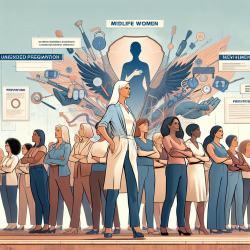Understanding the Challenges of Unintended Pregnancy in Midlife Women
Unintended pregnancies among midlife women are increasingly being recognized as a significant issue in the United States. Despite the common assumption that older women are well-versed in fertility control, many still face the challenge of unintended pregnancies. This is due to a combination of factors, including changing relationships, limited knowledge of safer sexual practices, and less predictable menstrual cycles.
The Framework for Prevention
The research article "Unintended pregnancy: a framework for prevention and options for midlife women in the US" proposes a comprehensive framework for preventing unintended pregnancies. This framework is grounded in primary health care and includes primary, secondary, and tertiary prevention strategies.
- Primary Prevention: Focuses on promoting intended pregnancies and reducing adverse events. This includes preconception care, reproductive life plan development, and contraception education.
- Secondary Prevention: Aims at early identification of unintended pregnancies to improve reproductive health outcomes. This involves pregnancy diagnosis and options counseling.
- Tertiary Prevention: Concentrates on preventing complications from later unintended pregnancies and supporting women who experience them.
Implications for Practitioners
Practitioners can improve their skills by integrating this framework into their practice. Here are some actionable steps:
- Incorporate discussions about reproductive life plans and contraceptive options during consultations with midlife women.
- Enhance awareness and education about the risks of unintended pregnancies and the importance of regular contraceptive use.
- Provide comprehensive counseling and support for women who experience unintended pregnancies, ensuring they are informed about all available options.
Encouraging Further Research
The article highlights the need for more research into the sexual and reproductive health patterns of midlife women. Practitioners are encouraged to engage in or support research efforts that aim to fill the data gaps and improve health outcomes for this demographic.
To read the original research paper, please follow this link: Unintended pregnancy: a framework for prevention and options for midlife women in the US.










